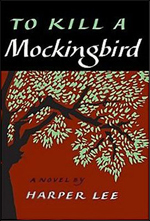| |
1960s |
| |
The Collector, John Fowles
Cosmos, Witold Gombrowicz
The Happy Birthday of Death, Gregory Corso
Herzog, Saul Bellow
In Cold Blood, Truman Capote
The Joyous Cosmology: Adventures in the Chemistry of Consciousness, Alan Watts
Labyrinths: Selected Stories & Other Writings, Jorge Luis Borges
Rabbit, Run, John Updike
Revolutionary Road, Richard Yates
Silent Spring, Rachel Carson
To Kill a Mockingbird, Harper Lee
We Have Always Lived in the Castle, Shirley Jackson
Where the Red Fern Grows, Wilson Rawls
Who’s Afraid of Virginia Woolf, Edward Albee |
|
|
To Kill a Mockingbird, Harper Lee
J. B. Lippincott & Co., July 11, 1960
It was a time to remember. I think back to when I realized that the experience of reading a book could change the score. The horror books that really got me into reading in the first place were always fun (still are) but it was a whole new experience to read a book that made you think about bigger things, or at least, made you think about things in a deeper way, like what it meant to stand up to prejudice and bigotry, even in the face of fear.
Jem turned around and punched his pillow. When he settled back his face was cloudy. He was going into one of his declines, and I grew wary. His brows came together; his mouth became a thin line. He was silent for a while. “That’s what I thought, too,” he said at last, “when I was your age. If there’s just one kind of folks, why can’t they get along with each other? If they’re all alike, why do they go out of their way to despise each other? Scout, I think I’m beginning to understand something. I think I’m beginning to understand why Boo Radley’s stayed shut up in the house all this time …
it’s because he wants to stay inside.”
A funny thing happened during the United States presidential election of 2008. Voters didn’t hide inside any longer, and instead came out in the spirit of inclusion. Right here in our back yard, the eyes of the world were upon us as we stood shoulder to shoulder under an unusually warm, perfectly dreamy mid-fall night. It was certainly rare air that we were experiencing for a November 4th in Chicago. It made the evening all the more surreal.
“If there is anyone out there who still doubts that America is a place where all things are possible, who still wonders if the dream of our founders is alive in our time, who still questions the power of our democracy, tonight is your answer.
[...]
It’s the answer spoken by young and old, rich and poor, Democrat and Republican, black, white, Hispanic, Asian, Native American, gay, straight, disabled and not disabled. Americans who sent a message to the world that we have never been just a collection of individuals or a collection of red states and blue states...”
-President Barack Obama, (from his acceptance speech, Tuesday, Nov. 4th, Grant Park, Chicago, IL)
Even after the bunting had been tucked away, the high lingered. We reflected as a country upon how far we had come, which isn’t to say that amidst the jubilation there did not exist a fair number of cracks. We were still mired in a grim recession, the housing market was tanking, we were stuck in the war on terror that had no end in sight, Osama bin Laden was still free, 4.4 million jobs were lost during Bush’s final year in office alone, outsourcing was at its peak, the reality of climate change was—according to the environmental experts—very real, and we still had to figure out a way to save face against an increasing anti-American sentiment that had surfaced in the wake of the Bush doctrine and other tragic foreign policies including the much publicized use of torture endorsed in a memo by the administration. Even the 2008 election results that gave birth to an incredible manifestation of hope also carried—riding shotgun—the bitter defeat of a minority group’s human rights. California passed the infamous Prop 8. Similarly, in Florida and Arizona, committed, loving relationships were legally dismissed. Arkansas took it one step further stripping homosexuals of their right to adopt children and build loving families. The rights of a minority group were decided by the vote of a simple majority. The dreams of many had been shattered. Win some, you lose some.
“In matters of conscience, the law of majority has no place.”
-Mahatma Gandhi
“The majority, oppressing an individual, is guilty of a crime, abuses its strength, and by acting on the law of the strongest breaks up the foundations of society.”
-Thomas Jefferson
Still, even though the spirit of prejudice was alive and well, there was an undeniable emergence of a brave new optimism that dominated the headlines in 2009 when Barack Obama was sworn in as President of the United States of America.
It was a time like no other. It was a time when Boo Radleys could come out of the darkness. They could wonder or fantasize that maybe the rhetoric of hate was on the run now, like the crap that says the color of one’s skin was where it was at or that sexual preference actually meant something. History will most assuredly laugh at such a notion, but for a short time anyway, it sure felt good to dream.
It was a time to remember.
-G

|
|
 |

